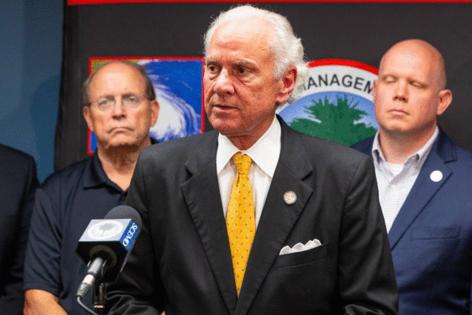Gov. McMaster opposes offshore drilling along South Carolina coast as feds seek more energy
Published in News & Features
COLUMBIA, S.C. — Gov. Henry McMaster announced his opposition Monday to drilling for oil and gas off the South Carolina coast, saying the practice could hurt beaches, wildlife and the state’s lucrative, multibillion-dollar tourism industry.
In a news release Monday afternoon, Republican McMaster said he and North Carolina Gov. Josh Stein, a Democrat, have written a letter to the federal government that says the Carolinas should remain protected from drilling.
South Carolina’s environment, with extensive beaches and wildlife preserves, helps fuel the economy, said McMaster, an enthusiastic supporter of President Donald Trump.
“This unspoiled natural beauty is the foundation of a $29 billion tourism industry supporting millions of annual visitors and tens of thousands of jobs in communities like Myrtle Beach, Charleston, Hilton Head and Beaufort,’’ the governor said. “These communities rely heavily on the health of our coastal environment. We cannot afford to jeopardize it.”
McMaster’s stance on offshore drilling mirrors the position he took more than seven years ago, when Trump’s administration examined whether to open areas along the Atlantic Coast to drilling for the first time.
Trump ultimately dropped much of the Atlantic, including waters off the Carolinas, Georgia and Florida, as possible drilling sites after an outcry from southern governors and cities in the Southeast. The area was supposed to be off limits until 2032, according to a moratorium Trump invoked in 2020.
Now, concerns are rising that the Trump administration will revive Atlantic drilling as it develops a new five-year plan for exploration and drilling across the country.
A key part of Trump’s current agenda is expanding places where oil and gas can be found and extracted. All U.S. coastlines are under consideration for drilling, according to the Surfrider Foundation, a national beach advocacy group.
The deadline for the public to submit comments on drilling along the coast was Monday. Much of the nation’s offshore oil drilling occurs in the Gulf of Mexico, where multiple spills have occurred.
Michelle Bivins, a spokeswoman for the environmental group Oceana, said actions by McMaster and Stein show bipartisan concern about the prospects of oil-drilling along the south Atlantic coast.
“Governor Stein’s and Governor McMaster’s commitment to protecting our coastlines and the vital industries they support is deeply appreciated,’’ she said in an email. “This bipartisan letter is directly in line with the expressed wishes of our coastal communities, and it sends a powerful message that their voices are not just heard, but are paramount.’’
Drilling for oil and natural gas has the potential to industrialize parts of the coast with infrastructure, pipelines and boat traffic, all of which could degrade the coastal environment, critics have said. The biggest concern is the possibility of a major oil spill near places like Myrtle Beach, Folly Beach and Hilton Head Island, critics say.
It’s largely unknown how much oil or natural gas may exist off the South Atlantic coast, but supporters of oil and gas drilling have said it’s at least worth looking to determine what is out there.
Others say it isn’t worth the risk, arguing that major spills have occurred in the Gulf, causing an array of pollution problems on beaches and in wetlands.
Most South Carolina coastal cities came out against drilling during the first Trump administration, and many maintain that position now, including Charleston and Beaufort. One of the most conservative members of Congress, Rep. Russell Fry, R-SC, says he’s against drilling along the South Carolina coast, as has Rep. Nancy Mace, R-SC.
Charleston Mayor William Cogswell said he’s worried about drilling hurting the historic city’s environment and way of life. Cogswell outlined what’s at risk in a recent letter.
“The economy of Charleston depends heavily on a healthy coastal and marine environment, supporting industries such as tourism, recreation, commercial and recreational fishing, and related small businesses,’’ Cogswell said in a letter to the federal Bureau of Ocean Energy Management.
©2025 The State. Visit at thestate.com. Distributed by Tribune Content Agency, LLC.







Comments